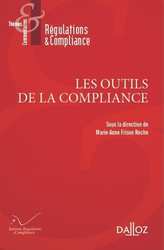SALAH, Mahmoud Mohamed🕴️
📝Conception et application de la compliance en Afrique, in 🕴️M.-A. Frison-Roche (ed.), 📕Les outils de la Compliance
pour lire cette présentation en français ↗️cliquer sur le drapeau français

► Full Reference: M. M. Salah, "Conception et application de la compliance en Afrique" ("Conception and application of Compliance in Africa"), in M.-A. Frison-Roche (ed.), Les outils de la Compliance, coll. "Régulations & Compliance", Journal of Regulation & Compliance (JoRC) and Dalloz, 2021, p. 165-180.
____
📕read a general presentation of the book, Les outils de la Compliance, in which this article is published
____
► Summary of the article (done by the Journal of Regulation & Compliance): The author presents the way in which Compliance, which may seem "insurmountable" in Africa in particular with regard to corruption, even terrorism, a gravity offset by the prevalence of the group's solidarity on the Weberian conception of Law, nevertheless aims to to "deploy" in Africa.
It describes the way in which in certain African countries the Compliance mechanisms have been established, under the influence of international institutions requiring first of all the autonomy of economic structures vis-à-vis social structures and then relaxing them so that they are more "human" and therefore more "sustainable". Under the aegis of the United Nations, anti-corruption programs have been particularly deployed. But the African Union and sub-regional organizations have also helped design and implement anti-corruption programs, for example through the adoption of uniform laws. In addition, the extraterritorial effect of foreign laws, in particular the FCPA, Bribery Act and Sapin2, increases this anchoring of Compliance.
The article shows that this anchoring translates legally into a transformation of materials. In the first place, banking and financial law welcomes it more readily, since it tends to be globally standardized, African rights participating in this globalization, and imposes on financial institutions and beyond a general obligation of vigilance, in particular as regards the risk of money laundering and terrorist financing, an obligation to alert and specific criminal liability of legal persons. Secondly, all African legislation is aimed at combating corruption through Compliance, which mainly aims at prevention.
But the author measures their effectiveness ("that is to say their ability to produce the desired results" which is often still limited. This is mainly due to the conjunction between the size of the informal sector, notably hampering 'identification of the actors, and the weakness of state structures which, allied to the low level of banking services and the still weak culture of writing and recording, leaves the system without crucial operators who can be entrusted with the realization of Compliance Law.
The author concludes that it is not the risk of national sanction that leads operators to respect the Compliance rules but the fear of losing markets by the external threat of international actors and the damage to their local reputation and to abroad. The weakness of state structures affecting the effectiveness of Compliance as it affects everything else, he underlines that they must be strengthened for this to be reinforced for the rest, in particular concerning the effectiveness of judicial control.
More specifically, Compliance should be less expensive because African States often cannot bear the cost, only the subsidiaries of large foreign private groups can do so, which leads to abandoning Compliance at the will of the private sector, a phenomenon regrettable, whereas public supervisors do not have the means to exercise their control function.
________
comments are disabled for this article